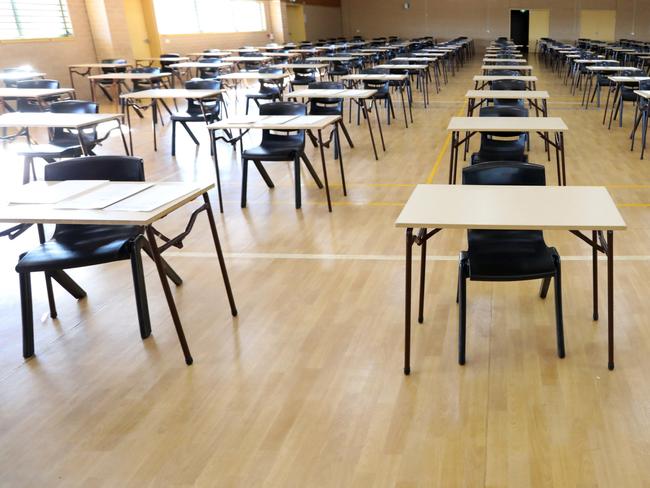Extra time, personal laptops: Disability provisions for every NSW school
Private schools applied for HSC disability provisions at a higher rate than public schools last year, while more than 1000 students required someone to read them their exam.
NSW
Don't miss out on the headlines from NSW. Followed categories will be added to My News.
- ‘Cough and you’re out’: Strict COVID HSC rules
- Sneaky HSC students could call in sick to lift exam scores in COVID
More than 1000 students sitting their Higher School Certificate exams on Tuesday are not expected to be able to read their exam papers unassisted, with the number of functionally illiterate students almost doubling in the last three years.
The number of students “with low reading ability, as demonstrated on an accepted reading test” and who qualified for someone to read them their exams jumped from 595 students in 2016 to 1167 last year, according to NSW Education Standards data.
Across school sectors, 14.3 per cent of private school students enrolled to complete the HSC last year had applied for disability provisions compared to just 8.5 per cent of public school children and 11 per cent of pupils in Catholic schools.
RELATED: HSC students face COVID mental health crisis, young women hit hardest
Private schools were slightly more likely to have their disability provision requests rejected, with 114 private school students having their applications denied while 834 were only partially approved.
MORE NEWS
Western Sydney airport $27m overspend ‘covered up’
Ausgrid to axe 500 management and backroom jobs
King Kyle conquers a new world as sangria takes award
Association of Independent Schools of NSW Chief Executive Dr Geoff Newcombe said all schools had a responsibility to ensure students with recognised disability can participate in exams on the same basis as their peers.
“The process for applying for disability provisions was reviewed recently. It is rigorous and requires medical diagnosis and substantial evidence,” he said.
“Independent schools across the socio-economic and geographic spectrum take this responsibility seriously and apply on behalf of their students with disabilities.”
University of NSW education expert Dr Jihyun Lee attributed the decline in students’ reading ability to the replacement of books with screens and video games over the last two decades.
“This phenomenon of the digital effect on reading and writing has been in existence since the 1990s,” she said.
“All of a sudden students cannot write full sentences very well … It is because of the distractions of games and all these things... Finally, the effect is being seen in students.”

A spokeswoman for the NSW Standards Authority which approves HSC disability provisions said the rules were altered after a 2016 review and more students were now eligible for a reader and extra time provisions.
“NESA provides disability provisions to ensure all students have a fair opportunity to show what they know in the HSC exams,” she said.
Readers are approved for students who cannot independently read exam questions and have a low reading ability as demonstrated on an accepted reading test.
The total number of concessions made to students has ballooned by 25 per cent in the past three years from 9878 in 2016 to 12,284 last year.
That includes 4657 students last year who had “demonstrated pain, anxiety disorder or concentration issues” which qualified them for five minute rest breaks every 30 minutes.
The number of students given extra time to complete their exams because they either had a “very limited reading ability” or vision or cognitive disabilities almost quadrupled from 273 students to 947 between 2016 and 2019.
And last year 807 students with “illegible writing” or “poor spelling” or an injury which made it too painful to write were allowed to dictate their responses to a scribe and given an extra five minutes for every hour of an exam.

Centre for Independent Studies education expert Glen Fahey said giving concessions to students who were not academically inclined was unfair on students who did study.
“I worry about some of these provisions because in large part they are to accommodate students who shouldn’t be sitting an HSC if we’re honest,“ he said.
“A lot of these additional concessions are made for students who otherwise would not be able to complete an exam.
“The question ultimately becomes, is it good for the integrity of the HSC as a meaningful assessment of student ability? Is that meaningful once you provide a great deal of concessions to quite a large number of students?“
The number of students suffering pain or a “concentration disability” has doubled in the past three years to 2019 from 256 in 2016 to 575 last year.

Literacy instruction provider Multilit’s Dr Jennifer Buckingham said the figures showed some students who struggled with reading were now getting the help they needed but warned some students’ claims were not genuine.
“It is more likely to reflect that students are becoming aware that this option is available to them and being more likely to use it and seek any kind of advantage where they might be able to find it,” she said.
“Things like having a scribe, being able to take breaks, there are lots of provisions available to students if they have some sort of medical note or whatever the requirements are.”
“I am sure some of these are genuine, some of them are probably not.”
Under new rules introduced this year students must also pass a “minimum standard” test in reading, writing and numeracy in order to be awarded the HSC. Students who do not make the grade are still able to do HSC courses, sit the exams and even be awarded an ATAR to gain entry to university — but will not be awarded the HSC certificate.
By May of this year, 5926 students in the HSC class of 2020 had not passed the minimum standard test, including 1669 students who could not pass the reading test and 4500 pupils who could not pass the writing test.
Originally published as Extra time, personal laptops: Disability provisions for every NSW school
